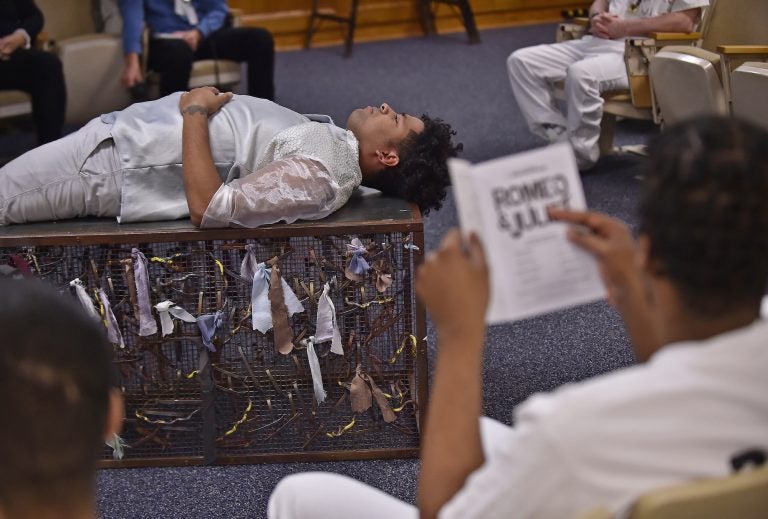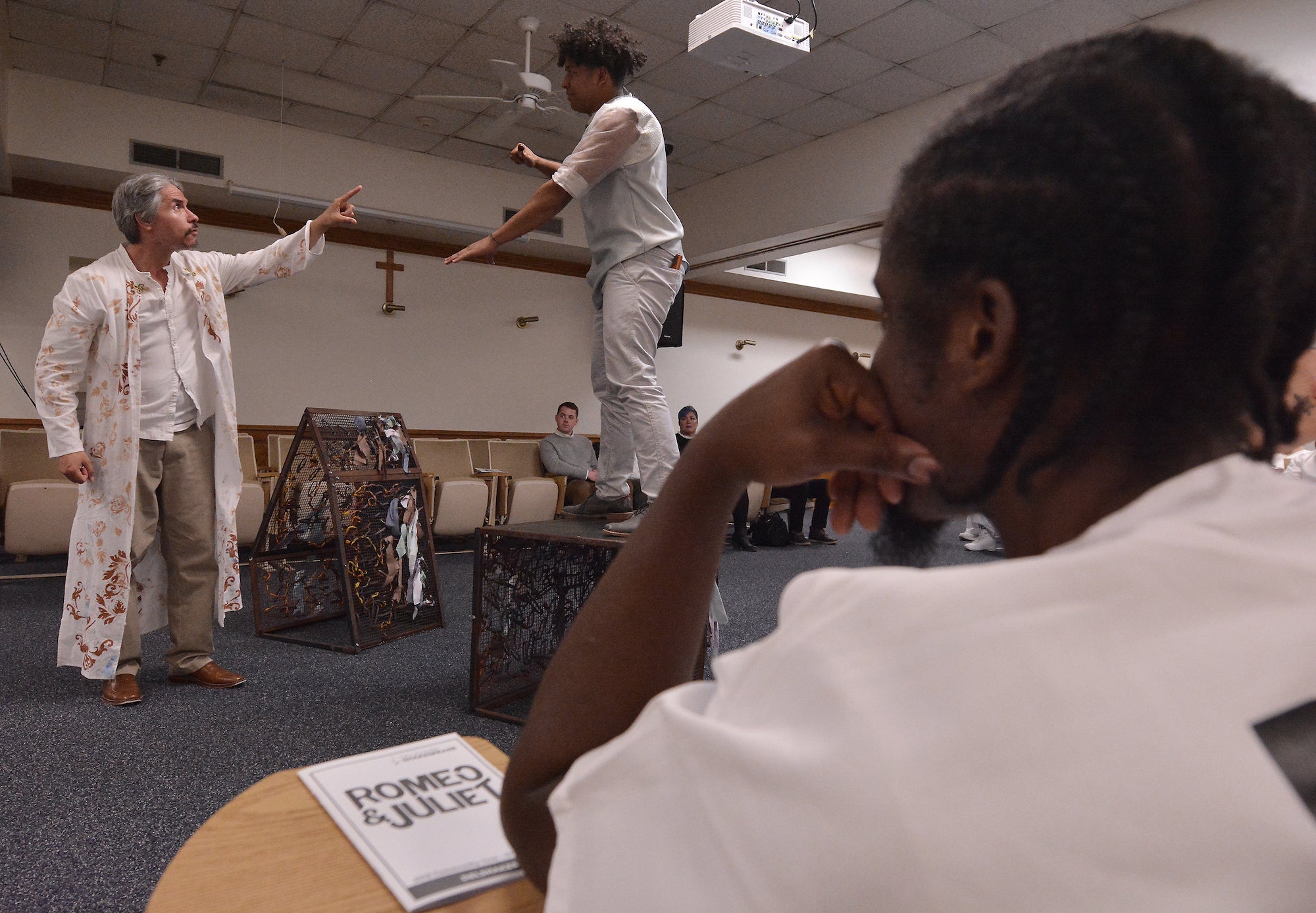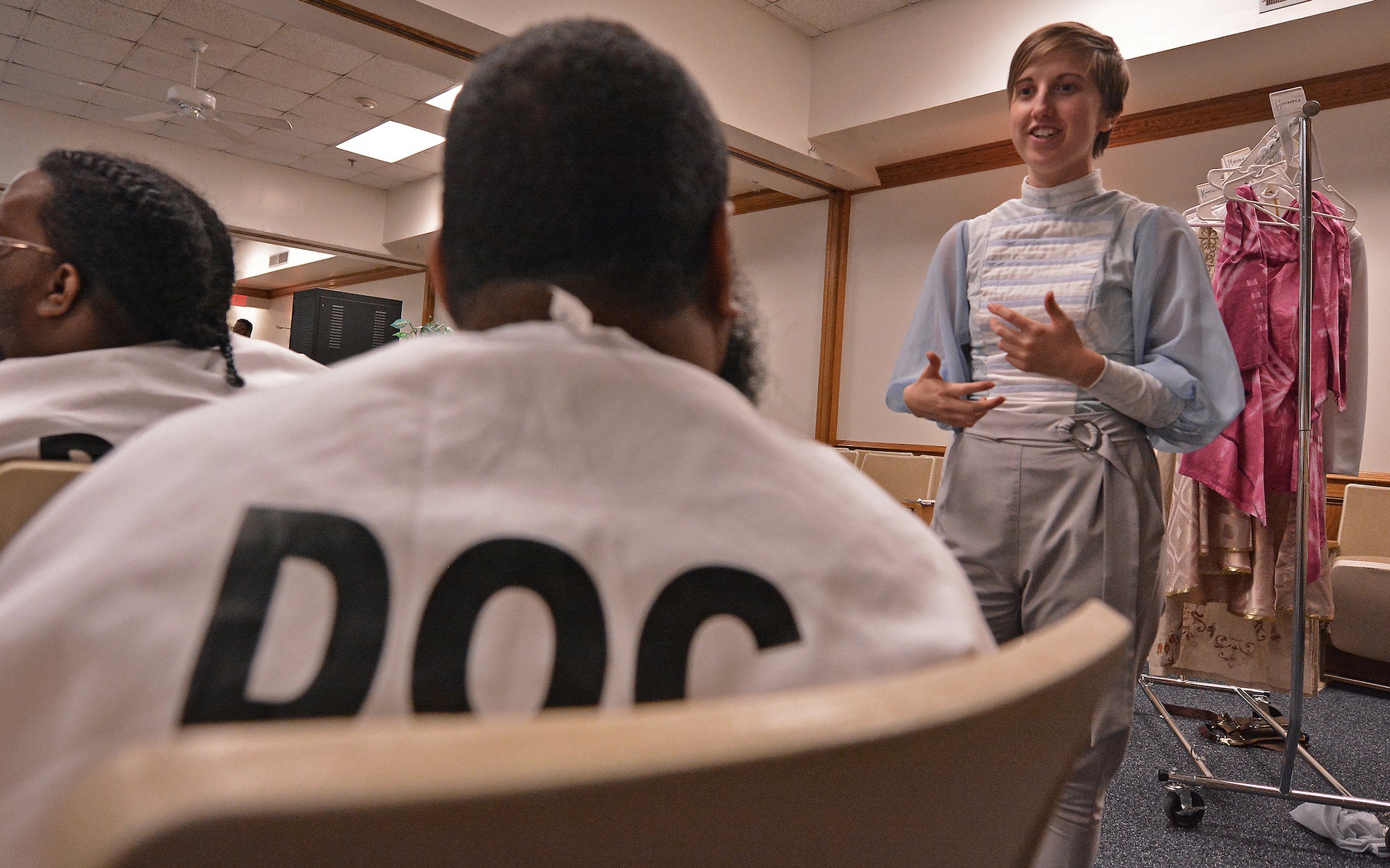Shakespeare performance behind bars provides mental escape in Del. prison
Fifty people incarcerated at the maximum-security facility got a private afternoon performance of the Bard’s “Romeo and Juliet.”
Listen 4:48
Delaware Shakespeare actor Wilfredo Amill plays the part of Romeo during a performance of Romeo & Juliet held at the Howard R. Young Correctional Institution in Wilmington on Tuesday, November 12, 2019. (Butch Comegys for WHYY)
The chapel room at Howard R. Young Correctional Institution in Wilmington transformed into “fair Verona” for Delaware Shakespeare’s performance of “Romeo and Juliet” on Tuesday afternoon. The prison is a maximum-security facility that houses some 1,500 inmates, including people serving long-term sentences, or who are awaiting trial or being held on bail.
The audience of about 50 people, dressed in white jumpsuits, sat quietly through the intimate 2 ½ hour performance. The men seemed enthralled by the play.
“As we’re going through the show, we know they’re with us,” said Newton Buchanan, who played Juliet’s father, Lord Capulet. Buchanan also played the Apothecary, who provides Romeo with the dose of poison that precipitates the show’s tragic ending.
“It’s really great to see the looks on their faces, to know when they are sad or hear them laughing at certain things,” he said.

The prison performance was part of the troupe’s community tour, an effort to offer the theater experience to a broader spectrum of the population. The theater company traditionally does performances over a two-week stretch in the summer at Rockwood Park in northern Delaware.
“We always thought that we were doing Shakespeare for everybody. You’re outdoors, and ticket prices are pretty inexpensive,” said David Stradley, Delaware Shakespeare’s producing artistic director.
But a closer look at the numbers revealed that the audience for those summer shows wasn’t representative of the entire community. So four years ago, the company launched a fall tour to perform for groups that wouldn’t normally see a Shakespeare play.
“We go all over the place: prisons; homeless shelters; community centers; libraries; mental health facilities; senior centers — anywhere we can get to where people may not have easy access to the arts.”

Sol Madariaga, who plays Juliet, said she enjoys being able to talk to the inmates during intermission and after the performance.
“We feel so blessed to be able to bring them this opportunity,” she said. “Acting can be such an egocentric profession. I feel like this is the most selfless you can get in our jobs.”
Though “Romeo and Juliet” is a romantic story, it also includes scenes depicting murder and suicide. Fight scenes in the prison required some special tweaks to the traditional props. That meant sword fights were depicted using wooden sticks about six inches long. The beating of a drum was used to represent the sounds of battle.
Stradley said the themes in “Romeo and Juliet” — love, hate, jealousy and vengeance — are especially relatable in a prison setting.
“As long as men are killing other men, these plays are going to have relevance,” he said one person incarcerated in San Francisco told him. “As an artist, you’re always wanting your plays to resonate in the most deeply lived way possible, and these plays resonate in prison environments.”

Earlier this year, Delaware launched an effort to help people returning to their communities after serving time. About 76% of people return to prison within three years, more than 4,500 of the 6,000 released every year.
State Rep. Paul Baumbach, who attended Tuesday’s performance, said the arts can provide this population a glimpse of life on the outside and give them something to look forward to when they’re released.
“The arts give you a chance to escape sometimes,” he said during an intermission. “I imagine it could be a pretty monotonous life in here, so I think it’s helpful to have opportunities like this.”
The chapel’s small size forced the attendees to sit close to the action, providing a more intimate experience than many theatergoers get.
“The intimacy also drives a lot,” Buchanan said. “We select volunteers out of the audience for certain parts. We interact with the inmates and make them a part of the play. That’s really important to us.”
Although Delaware Shakespeare performs for free, state Department of Correction officials said there is a cost to the agency, to provide extra guards to monitor security during the performance. Those incarcerated at the Delaware facility didn’t have to pay for tickets and are selected after applying to attend.
To apply, they are required to send letters to volunteer services coordinator Theresa Bradley. They also need to have records of good behavior.
“We believe that collaborating with community partners such as Delaware Shakespeare upholds a portion of the Department of Correction’s mission, and that is to provide treatment and rehabilitation services to the adult offenders,” Bradley said. Prison officials hope “that the men gain an appreciation for dealing with life’s circumstances through the expression of art.”
That’s Rep. Baumbach’s hope, too.
“We used to think that prisons were a place to have people rehabilitate themselves,” he said. “I think in Delaware, and in many states, we do a pretty poor job of that. If this can be one small step of helping people have that vision of what they can do afterwards, that can be one small step in that direction.”
Delaware Shakespeare plans to continue playing to audiences behind bars. It’s held a 10-week acting class at Baylor Women’s Correctional Institution, and Stradley would like to expand that effort.
“The guys at Young have said the same thing: You’ve got a decent amount of people here watching this, but if you did an acting class, we would all jump at that,” Stradley said.
WHYY is your source for fact-based, in-depth journalism and information. As a nonprofit organization, we rely on financial support from readers like you. Please give today.




